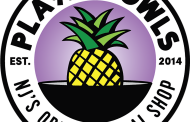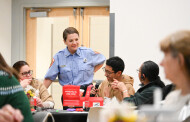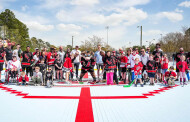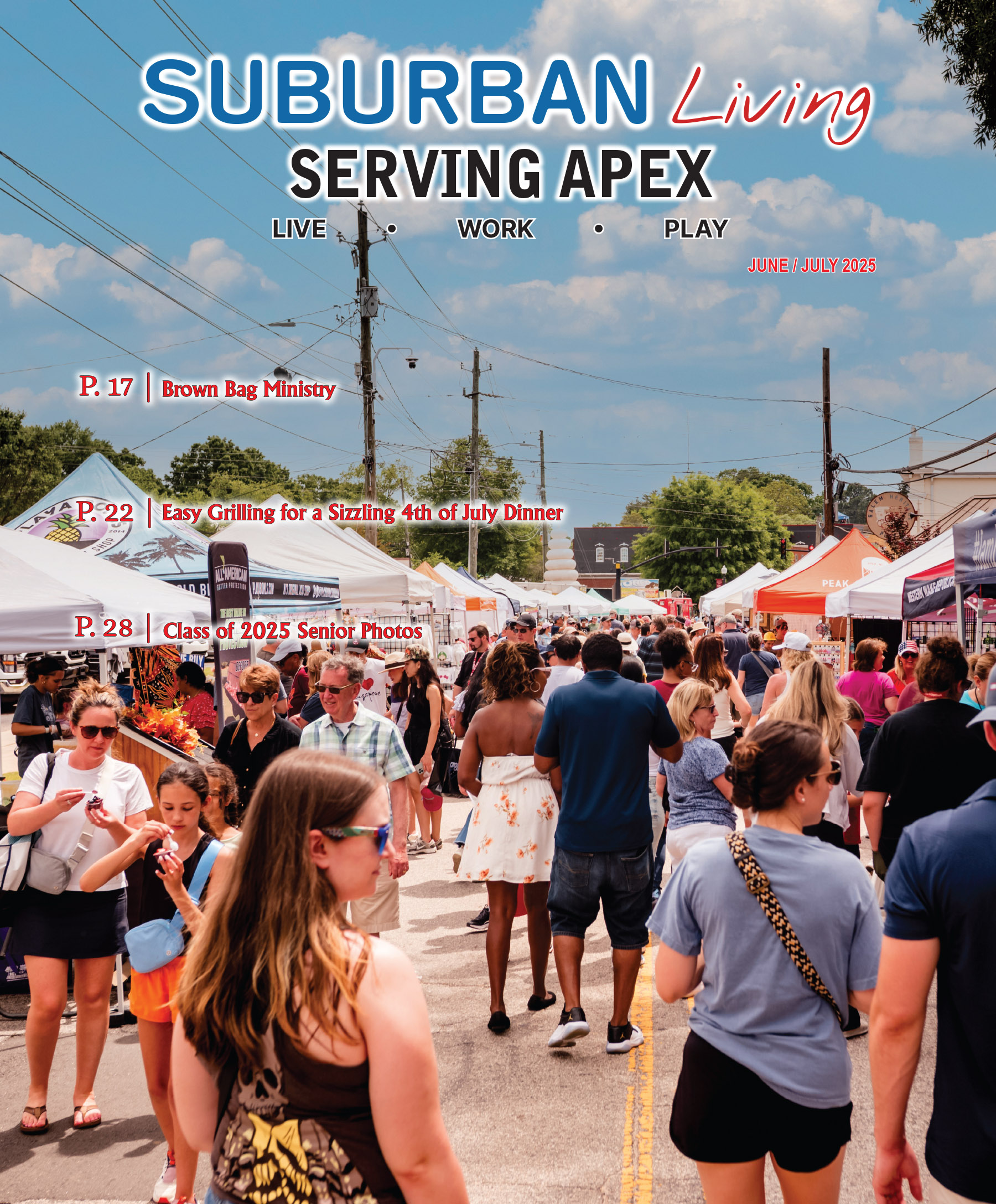For certain generations, the terms “Home Ec” and “Future Homemakers of America” conjure images of high school students learning to cook and sew with only one goal in mind—running a household. Well, sweep that stereotype away.
Home economics has evolved into Family Consumer Sciences (FCS), and along with the national Family, Career and Community Leaders of America (FCCLA) student club, the focus is squarely on career preparation and exploration.
Dawn Harrison, an FCS teacher and the FCCLA club advisor at Apex Friendship High School (AFHS), said the shift to a career focus began in the mid-1990s, but preconceived notions still exist today among the general public.
“I think there are a lot of misconceptions,” she said, adding that students understand the focus of FCS, but their parents still think of it as the home economics they grew up with. Household skills are still part of FCS, but overall things have shifted from a “home type of model to a career model,” according to Harrison. And the FCCLA is an extension of that curriculum focus through competition projects and club activities in school and in the community.
The FCS program falls under the larger umbrella of Career and Technical Education (CTE), which aims to combine academic foundations with technical skills and hands-on experience. Within FCS are class groupings that form specific career pathways students can follow in NC. The pathways are apparel and textile production, counseling and mental health, culinary arts applications, culinary arts internship, early childhood development and services, food and nutrition, food products and processing systems, hospitality and tourism management, interior design, and teaching/training. The pathways available at each Wake County school vary throughout the school system.
FCCLA, founded in 1945 and previously known as Future Homemakers of America, is a national, career and technical organization for students in FCS classes in public and private schools through grade 12, according to its website.
Part of FCCLA’s stated mission is “to promote personal growth and leadership development” through FCS education. The goals of FCCLA participation are to bolster career and college readiness, further explore career pathways and develop real-world life skills. FCCLA focuses on career pathways that relate to four categories: human services, hospitality and tourism, education and training, and visual arts and design.
The organization has over 230,000 members and 5,100 chapters across the country, including those at Apex High School (AHS) and AFHS. Club membership is open to students taking classes to complete an FCS pathway, as well as students who only take one or two FCS classes and that’s it.
“We’re co-curricular so everything we do in class is connected or could be connected to FCCLA,” said Rebecca O’Brien, a culinary arts instructor and foods and nutrition teacher at AHS and the lead advisor of the school’s club.
Along with old home ec notions is the idea that schools don’t teach professional and life skills, but those are the very ones FCS and FCCLA promote.
“I hear it a lot when I tell people what my job is or I just hear it from the public or I’ll see it on Facebook: ‘Oh, they should be teaching these skills in schools or I wish this was taught,’” O’Brien said. “I just want to say, ‘It is taught in school. We do have family consumer sciences classes in everything from child development to food and nutrition. There are honors levels. Students get the opportunity to go on field trips, hear guest speakers, have live work experience with internships’…I think a lot of people don’t quite realize that. There is so much opportunity.”
Harrison described the FCS classes and pathways as “resume builders” helping students whether they go to college, a technical school or straight into the workforce. “[Students] are going to walk out of here with a skill set,” she said.
At AHS, students can gain real-world skills and experience through the Palm Leaf Cafe, a student-run, in-school coffee shop/cafe for teachers and staff. Through the cafe, students prepare coffee, cold lunches and pastries. The cafe is fully inspected and does local catering. The cafe is part of Erica Hoskins’ Culinary Arts II class and, by extension, the FCCLA club. Hoskins is a culinary arts instructor, the school’s CTE department chair and a FCCLA club advisor. Students who are in the culinary classes and the FCCLA club manage the cafe. From cleaning to barista duties, Hoskins encourages students to rotate through all the cafe positions so they learn a variety of skills and step outside of their comfort zone. For instance, a shy student learns to be comfortable taking and calling out coffee orders.
Hoskins said the different FCS career pathways, which are supported by FCCLA activities, not only allow students to experience different types of careers, but also prove helpful as they figure out their next steps whether they enter the workforce after high school or college.
“We are training them for the workforce,” she said. “So, they are getting all the soft skills, but then they’re also working really hard. They are interning at childcare centers, running a cafe…So, they are getting a chance to see, ‘Maybe I do want to do something with food when I get older or maybe I do want to work with children.’”
Harrison agrees with the exploration aspect of FCS, especially learning about the variety of careers in a particular field and how they relate to academic interests.
“When students come into family consumer sciences education, they can explore so many careers and they explore the actual core contents they love—math, science, history, language arts—and they can see how they apply it to a real career,” she said. “For example, if a student wanted to be a chef and they love science, there are so many careers around science and foods that they don’t think about because they’re just thinking about cooking. They are exposed to a deep dive into that career through the pathways. They go deeper through each course they take.“
Harrison, who teaches the fashion classes at AFHS, said this is true for all the FCS pathways and used her own as an example. “A student can explore what it looks like to not only be that typical fashion designer—because that is what they first think about—but they can see what that pathway looks like if you go down the manufacturing side, as well as the business side because we have fashion merchandising. So they really can make some good decisions.”
Making these decisions is bolstered when the FCS education is combined with FCCLA participation as seen with AHS’s Palm Leaf Cafe and AFHS’s Patriot Pals.
The Patriot Pals program, which is named for the high school’s mascot, allows club members interested in becoming teachers or working with children practical experience as classroom volunteers at the neighboring Apex Friendship Elementary School (AFES).
Erin Mills, a counselor at AFES, conceived of the program and reached out to Harrison to involve the FCCLA club.
Typically, there is one helper per classroom. Mills said the club members are extra resources for the teachers and what they do depends on what’s needed that particular day. For instance, maybe the helper is traveling around the room making sure students are on the right page during instruction or working one-on-one with a student who needs extra help with reading or math.
The program, which started in the fall of 2023 with the FCCLA club, was such a success, participation was expanded to include other school clubs. “It’s a program that benefits everybody,” Mills said.
Zahlae McNair, the FCCLA club vice president and junior at AFHS, is among the Patriot Pals. McNair, who is considering a career in library science, credits the program for improving her communication skills, especially with children. “I feel like it’s helping me with developing different kinds of communication skills with not only my peers, but also younger children,” she said. “I didn’t grow up with siblings. I wasn’t really around children that much, so this is definitely a growth process for me, and I really enjoy it a lot.”
AFHS Senior Kaitlyn Graham said she is grateful for the experience gained as an officer and helping manage the club’s involvement in Patriot Pals. Graham has served as a club officer since ninth grade and is this year’s president. “Through FCCLA, I have been awarded so many different opportunities,” she said. “One thing I particularly value is the leadership opportunities the club provides. Being an officer, I have learned how to both plan and direct group activities.”
Other community activities for the AFHS club include making holiday cards for a local senior center and hosting food donation drives. Within the school, the FCCLA club promoted wellness by creating a “Wall of Positivity.” The special board included wellness tips and invited students to write positive affirmations and post them on the board.
Developing life and career skills is an aim of FCCLA not only through volunteerism and club activities, but also through project-based competitions at leadership conferences. FCCLA hosts regional, state and national competitions where students compete individually or as a team in Students Taking Action with Recognition (STAR) Events, which connect to the FCS curriculum. According to the FCCLA website, there are 30 different STAR Event categories. Students research and develop a project based on their chosen category and then present their project to a judging panel at competitions.
During the previous school year, Graham’s interest in a career working with children was reflected in her national-qualifying project in the “Focus on Children” STAR Event category. “I hope to work with children as a speech pathologist,” she said. “For my project, I compiled a presentation on the work I did with Scotts Ridge Elementary School. I combined my passions for social emotional learning and dance to create three lesson plans for first grade students.”
Harrison noted that the students’ hard work to prepare for the competitions comes with a big payoff—personal satisfaction. “It takes a lot of rigor to do this work,” she said. “The students learn so much about themselves and what it takes. Regardless of how they score, they come away so proud of themselves for the work that they have accomplished.”
Lillian Phillips understands this well. Phillips, who is currently a first-year student at East Carolina University (ECU), was co-president of the FCCLA club and a regular Palm Cafe staffer while an AHS student. Phillips competed with numerous projects on the state and national level throughout high school. For her senior year project–which won first place at nationals–Phillips created a business plan for a landscaping company called “Foodscape” that specialized in edible plants for the “Entrepreneurship” STAR Event.
Phillips is majoring in biology at ECU with plans to attend medical school. Although her college and career plans didn’t fall exactly within the focus of FCS and FCCLA, she said the skills she learned were applicable and valuable. “Even though I am choosing to not follow a major that falls under the FCS/FCCLA umbrella, my time in the organization has taught me a lot about personal management and how to use my time wisely in order to complete hard tasks,” she said. “With my projects, I had to learn a good bit about corporate finances and subjects that I otherwise wouldn’t have any exposure to, such as wage management, taxes, government resources and town laws. The presentation side of my projects also taught me about confidence and public speaking that I believe will help me both throughout college and into my career. I used to be super nervous about presenting but now I find it rather easy, with the right preparation.”
Emma Siber, who was co-president with Phillips at AHS and is also a first-year student at ECU, agreed. “I want to be a physical therapist. So, for me this was just an extra, fun class, but I also gained a lot of skills.” Siber noted how the club and the competitions helped her gain confidence, especially with public speaking. Like Phillips, Siber also competed on the state and national level during high school. “The number one skill I’ve learned is how to present to a group of people,” she said. “After presenting to judges, leading meetings and pitching ideas to my advisors, my presentation skills have increased greatly from freshman year when I would be nervous all day for a class presentation. This has made me more confident in myself and what I’ve put my time and effort into.”
During high school, Siber competed nationally in the “Chapter Project” STAR Event category. For this project, Siber hosted an in-school and community blanket and towel drive for local animal shelters. For another competition project, she focused on sports nutrition requiring extensive research on what athletes need, which was especially interesting for Siber who is now pursuing an exercise physiology major.
Siber said developing the projects and helping lead the club was time consuming while also juggling AP classes and after school jobs. But the skills she gained, such as time management, made it all worth it. “As co-president of FCCLA, I had to work with other members of the club, our advisors, lead a group of students, pitch the idea of FCCLA to students and parents and reach out to companies and adults. These leadership skills and general skills will help me be a more independent person and student.”
O’Brien said it’s gratifying as advisors to see students’ growth during their time in FCCLA. “It’s been nice to see students join freshman or sophomore year, then see the growth they make by junior and senior year and see how far they’ve come with presentation skills, leadership skills and how they work with others. It’s a proud moment for us.”
In addition to career exploration, life skill development and personal growth, Harrison said the students also benefit from the friendships and a sense of family developed within FCCLA. “That’s a really important component to our club, just building that family, that family piece.”
McNair felt the same. “You can get so close with your members.” she said. “I really love that bond we create.”
Phillips also noted the friendships. “I have developed strong relationships with my peers and advisors and found a sense of belonging and hard work in this program.”
For more information, visit apexhighfccla.weebly.com and follow apexfriendshipfccla on Instagram. Interested in having the AHS Palm Leaf Cafe cater your event? Check out the cafe website at www.mrshoskinsclass.weebly.com.









